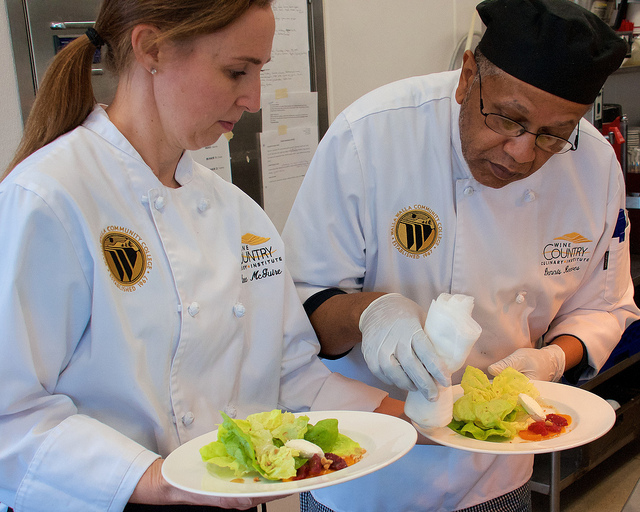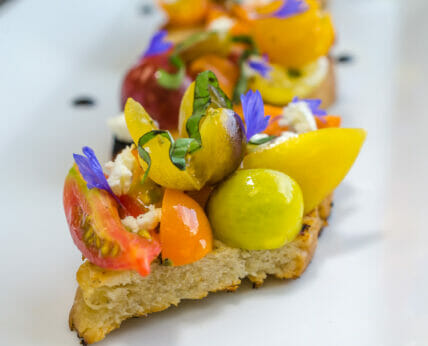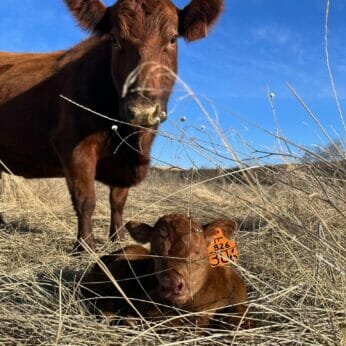Food Systems 101: How Community Colleges Are Helping Students Connect Farm to Fork
Community colleges are increasingly bringing hands-on food production into curricula in new and innovative ways.
Food Systems 101: How Community Colleges Are Helping Students Connect Farm to Fork
Community colleges are increasingly bringing hands-on food production into curricula in new and innovative ways.

Culinary students will get the chance to get their hands in the dirt with Walla Walla Community College's program. courtesy of WWCC.
On the back 16 acres of Walla Walla Community College, 30 Red Angus cows stand munching on hairy vetch, ryegrass and other cover crops that were planted to help restore the soil.
The cattle, which were artificially inseminated by students in the spring, will eventually be harvested at a USDA plant and incorporated into the fine dining menu at the college’s student-run campus restaurant, Capstone Kitchen.
Those cows are just one part of the closed-loop system the college aims to highlight in its new farm-to-fork program that is rolling out this school year. “The agriculture students will be growing and raising specialty crops and animals for us, and culinary students will get the chance to get their hands in the dirt to learn what it takes to grow a crop,” says chef-instructor and Top Chef alum Robin Leventhal. “It’s truly full circle.”
Walla Walla’s hands-on coursework is bringing together agriculture and culinary students as part of a nascent movement among community colleges that are increasingly bringing food production into curricula in new and innovative ways.
Walla Walla Community College’s program may be one of the most extensive culinary-agriculture curriculums, but there are others. Bakersfield College boasts an Edible Gardens Catalog program, Kalamazoo Community College offers Sustainable Food Systems Competencies coursework and Greenfield Community College’s Farm and Food Systems covers mushroom foraging and cultivation, permaculture design, beekeeping, food preservation and more.
The federal government is trying to help spur growth in these types of programs, too. As part of its efforts to foster a new crop of farmers, earlier this year, the USDA announced it would be investing $262.5 million in grants to higher education programs that serve underrepresented student populations as part of an inaugural program to build and sustain the next generation of the food and agriculture workforce.
Bergen Community College was one of the grant recipients, receiving a $4.5-million grant for its soon-to-come vertical farming, hydroponics and plant-based culinary arts programs. The grant, which will provide funding through June 2028, will help the college to enhance its current culinary, horticulture and science curriculum with new classwork that will explore sustainable food production and safety practices, waste management and agribusiness. “We already have horticulture and culinary programs, but this agriculture is new,” says PJ Ricatto, Ph.D., who will direct the new project. “As a suburban community college, we just ignored food production in our educational programs—and that’s going to change.”
The school ran an outdoor hydroponics farm this summer to help work out logistics on the soon-to-be-built indoor vertical farm. The next step is to get a greenhouse going in the fall and eventually scale up into a series of shipping containers. Over time, the administrators hope to expand with aquaculture, waste management, raised-bed gardening and more. Local vertical farmer Greens Do Good, which already offers training and employment for neurodiverse individuals, will be a close collaborator in the project. The company will help support the operation of the hydroponic facility, as well as provide learning and internship opportunities and potential employment paths for neurodiverse project participants and others.

These ties to local industry and economic needs are what make these sorts of programs so impactful. “The beauty of community college in the United States is it’s there to serve the community,” says Dr. Martha M. Parham, senior vice president of public relations for the American Association of Community Colleges. “They’re fueling the workforce pipeline in a lot of cases.”
“Colleges have to teach what’s trending, and the next generation is looking at what impact we have in this world and how we can support our community.”
While they differ in the students’ backgrounds and types of communities they serve, these new agricultural programs have quite a bit in common.
Like Walla Walla, the produce grown in Bergen Community College’s hydroponic learning lab facilities will also be used in the Culinary Arts program’s student-run cafeteria. Whatever is not used in that restaurant may end up being sold at a campus farm stand or donated to the school’s food pantry. Walla Walla Community College hopes to offer surplus agricultural products at its food pantry, too.
Studies have found that more than one-third of college students experience food insecurity at some point during their enrollment.
But where Bergen Community College aims to foster new farmers in a suburban-urban environment through vertical farms and hydroponics, Walla Walla’s program will expand upon an existing agroecology curriculum geared toward its rural students, many of whom may be seeking to bring their education back to family farms or other local agriculture. “Most of the people in our ag program are coming from an agrarian background but are trying to be innovative with new ways to approach farming,” says Leventhal.

The school, which is located in Washington State’s premier wine region, boasts one of the few agroecology-focused bachelor’s of applied science (BAS) degrees in the country. Several classes discuss using ecology principles to inhibit or get rid of weeds, for example. This coursework examines methods to use in various farming systems, including the crops or animals being reared, acreage, infrastructure, equipment and other factors that will impact a farm’s ability to reduce input costs while maintaining profitable production per acre. So, bringing in the cows (which are owned by a school instructor) to see what weeds they prefer to eat, and when, is an ideal demonstration for students who are trying to understand how these sorts of regenerative principles translate on an actual farm. “Agroecology incorporates the whole food systems and dynamics of the community,” says Alan Raeder, Ph.D., director of the Agriculture Science program. As part of that study, he says, “We are trying to produce and grow plants and animals that we need, and want to harvest them as close by as we can.”
While those bovines have been helping to restore the soil on their temporary pasture, the 18 raised beds that were planted last year and ⅛-acre demonstration field have all been prepared for the students who will be starting the program in September. About 100 pounds of potatoes have been harvested, and the already-planted tomatoes, chiles, herbs, green beans and cabbage will all be ready for students to work with when classes begin.
Many of the seeds were picked out last year, but the goal of the program is for both culinary and agriculture students to work with professors to not only figure out what will grow best and have the highest yields in the environment but what will impress customers in the restaurant. For upcoming semesters, that will likely include bright winter vegetables such as watermelon radishes, Chioggia beets, golden beets and other colorful, cold-hardy crops. “Finding the right fit is part of the trial and error of this, which is educational,” says Leventhal.
Selecting animals to raise and harvest will be a big part of the curriculum, too, but it is likely a bit farther out as the program gets better established. The program mimics the relationships between chefs and local farmers, so the students can work together in brainstorming what foods to cultivate for the restaurant and bistro—a real-world skill that Walla Walla Community College culinary and agriculture students are eager to learn. “Students drive curriculum,” says Leventhal. “Colleges have to teach what’s trending, and the next generation is looking at what impact we have in this world and how we can support our community—that’s such an important conversation that’s happening right now.”
Follow us
This work is licensed under a Creative Commons Attribution-NoDerivatives 4.0 International License.
Want to republish a Modern Farmer story?
We are happy for Modern Farmer stories to be shared, and encourage you to republish our articles for your audience. When doing so, we ask that you follow these guidelines:
Please credit us and our writers
For the author byline, please use “Author Name, Modern Farmer.” At the top of our stories, if on the web, please include this text and link: “This story was originally published by Modern Farmer.”
Please make sure to include a link back to either our home page or the article URL.
At the bottom of the story, please include the following text:
“Modern Farmer is a nonprofit initiative dedicated to raising awareness and catalyzing action at the intersection of food, agriculture, and society. Read more at <link>Modern Farmer</link>.”
Use our widget
We’d like to be able to track our stories, so we ask that if you republish our content, you do so using our widget (located on the left hand side of the article). The HTML code has a built-in tracker that tells us the data and domain where the story was published, as well as view counts.
Check the image requirements
It’s your responsibility to confirm you're licensed to republish images in our articles. Some images, such as those from commercial providers, don't allow their images to be republished without permission or payment. Copyright terms are generally listed in the image caption and attribution. You are welcome to omit our images or substitute with your own. Charts and interactive graphics follow the same rules.
Don’t change too much. Or, ask us first.
Articles must be republished in their entirety. It’s okay to change references to time (“today” to “yesterday”) or location (“Iowa City, IA” to “here”). But please keep everything else the same.
If you feel strongly that a more material edit needs to be made, get in touch with us at [email protected]. We’re happy to discuss it with the original author, but we must have prior approval for changes before publication.
Special cases
Extracts. You may run the first few lines or paragraphs of the article and then say: “Read the full article at Modern Farmer” with a link back to the original article.
Quotes. You may quote authors provided you include a link back to the article URL.
Translations. These require writer approval. To inquire about translation of a Modern Farmer article, contact us at [email protected]
Signed consent / copyright release forms. These are not required, provided you are following these guidelines.
Print. Articles can be republished in print under these same rules, with the exception that you do not need to include the links.
Tag us
When sharing the story on social media, please tag us using the following: - Twitter (@ModFarm) - Facebook (@ModernFarmerMedia) - Instagram (@modfarm)
Use our content respectfully
Modern Farmer is a nonprofit and as such we share our content for free and in good faith in order to reach new audiences. Respectfully,
No selling ads against our stories. It’s okay to put our stories on pages with ads.
Don’t republish our material wholesale, or automatically; you need to select stories to be republished individually.
You have no rights to sell, license, syndicate, or otherwise represent yourself as the authorized owner of our material to any third parties. This means that you cannot actively publish or submit our work for syndication to third party platforms or apps like Apple News or Google News. We understand that publishers cannot fully control when certain third parties automatically summarize or crawl content from publishers’ own sites.
Keep in touch
We want to hear from you if you love Modern Farmer content, have a collaboration idea, or anything else to share. As a nonprofit outlet, we work in service of our community and are always open to comments, feedback, and ideas. Contact us at [email protected].by Sara Ventiera, Modern Farmer
August 29, 2023
Modern Farmer Weekly
Solutions Hub
Innovations, ideas and inspiration. Actionable solutions for a resilient food system.
ExploreExplore other topics
Share With Us
We want to hear from Modern Farmer readers who have thoughtful commentary, actionable solutions, or helpful ideas to share.
SubmitNecessary cookies are absolutely essential for the website to function properly. This category only includes cookies that ensures basic functionalities and security features of the website. These cookies do not store any personal information.
Any cookies that may not be particularly necessary for the website to function and are used specifically to collect user personal data via analytics, ads, other embedded contents are termed as non-necessary cookies.
Inspiring !